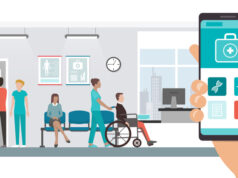
From L to R: Toby Cosgrove and CNBC’s Christina Farr
For more than a decade, Toby Cosgrove presided over the Cleveland Clinic, becoming one of the most prominent and innovative healthcare leaders in the country before announcing his retirement in 2017.
Earlier this year, news broke that he was taking a position at Google as an executive advisor to the Google Cloud Healthcare and Life Sciences team, part of the trend of tech giants bringing in healthcare expertise to boost their own efforts in the industry.
During an event Rock Health Summit in San Francisco, the always quotable Cosgrove shared his thoughts on topics ranging from the V.A. to Theranos to EMRs to where he believed big tech firms can hope to change healthcare.
On why he doesn’t regret Cleveland Clinic’s choice to be an early adopter of Epic Systems EMR technology:
I think the majority of major academic medical centers around the country have looked at the alternatives and voted for Epic.
Massachusetts General just spent 1.3 billion to bring in an electronic medical record, no only did they have to re-do it, but they had to train all of their employees. I don’t think that if you went to them and said ‘look we’ve got the greatest thing that has ever happened in electronic medical records’, they’re gonna say ‘well that’s nice, we’re gonna chuck this last $1.3 billion and bring in something new.’ I think the horse is out of the barn on that one frankly.
On some of the challenges of voice-enabled healthcare, which he dubbed the “killer app” that can be build on the existing EMR data resources:
I think it’s going have to be specialty by specialty and probably the hardest is going to be the primary care physician because they have to see everything that comes through the door.
On what he sees as the most pressing, low-hanging fruit problems for healthcare:
What hospitals are looking for is something that’s going to help the efficiency and help the hospitals by the taking the costs out. Where can they do that? First of all there’s a screaming need to handle all of this data and certainly we’re not efficient in running data centers.
The second thing is the two bookends of healthcare, getting people in for appointments and where the money is, sending out bills. You should be able to automate that somehow … The getting in to see a caregiver and getting a bill out are two of the screaming needs that have to be addressed.
On his early support of Theranos and Elizabeth Holmes, which included a “strategic alliance” with the Cleveland Clinic and a keynote speaker appearance at the Cleveland Clinic 2015 Medical Innovation Summit:
First of all the Cleveland Clinic and I did not invest. I did however feel that if Theranos worked it was such a tremendous game-changer that I thought the Cleveland Clinic could be in the front row with this.
What I said was if you send me the device, we will test it and if the tests are great we’ll write about it and publish it and if the tests are bad, we’ll publish that too. We never got a device.
I don’t regret the fact that we were out there trying to find something that could make a substantial difference … I don’t mind looking at things that may seem before their time because there’s got to be a first in that area. You’re gonna knock on a lot of doors and kiss a lot of frogs, but you got to do it.
On why he feels the augmented reality and Massive Open Online Courses (MOOCs) are technologies that can revolutionize medical education:
The other day I’m walking around a heart and I stick my head in the left ventricle and I’m looking at the outflow track and the underside of the aortic valve, a view I’ve never had before even with 30-years as a heart surgeon. You can now see the paths going through the brain with augmented reality. Think about the teaching you could do, the patient education you could do, the experiments that you can do.
Think about (an organic chemistry course) as a video, where you as a student can study it however they want and you could go back and go forward in the lecture. I think that democratizes education in a way that hasn’t been done before.
On the Amazon-Berkshire Hathaway-J.P. Morgan Chase healthcare alliance, its CEO Atul Gawande and why he hates the idea that tech is going to ‘disrupt’ healthcare:
These are three iconic companies with great leaders, terrific thinkers and doers. The history is that Warren Buffert’s No. 2 guy (Todd Combs) has been working on this for six years and this triumvirate came together rather rapidly.
I have tremendous respect for Atul Gawande, he writes about as well as anyone I’ve every really met. I tried to hire him ten years ago and in the middle of discussions with my successor who also tried to get him, he said ‘I have a proposal that’s a big deal and I don’t think I’m going to be going to the Cleveland Clinic.’
You have to understand that healthcare is the biggest industry in the United States and to disrupt something I think you have to completely change it and I think probably you’re not going to change this huge industry overnight. I think there’s going to be huge opportunity to change aspects of it, but it not going to be like ‘Boom, it’s all different now.’ I think the group is going to have a major effect on purchasing, they may have an insurance approach, they may do Accolade, so we’ll see.
On his decision to turn down both President Trump’s and Obama’s offers to become United States Secretary of Veterans Affairs:
President Obama asked me take the job right after the scandal about the waiting lists at the VA and he had 18 months left in his administration. The VA is a huge organization, 360,000 people for it, the budget is $180 billion and there’s 165 hospitals across the country and you had 18 months to change the culture of this vast organization and I didn’t think it was possible.
I thought the solution was to give veterans a choice, you could either go to the private sector like 330 million other people do, or you could go to the VA and that would have two results, either the VA was going to pick up its act and look after people and drive quality and be more patient friendly or it was going to fall under its own weight, but the veterans would ultimately be better off.
Then Trump came in and I spent a lot of my time talking to senators and representatives about whether we could get something like that done and the long and short of it was I concluded that wasn’t going to be politically possible, so I said no thank you.
Picture: Kevin Truong, MedCity News








